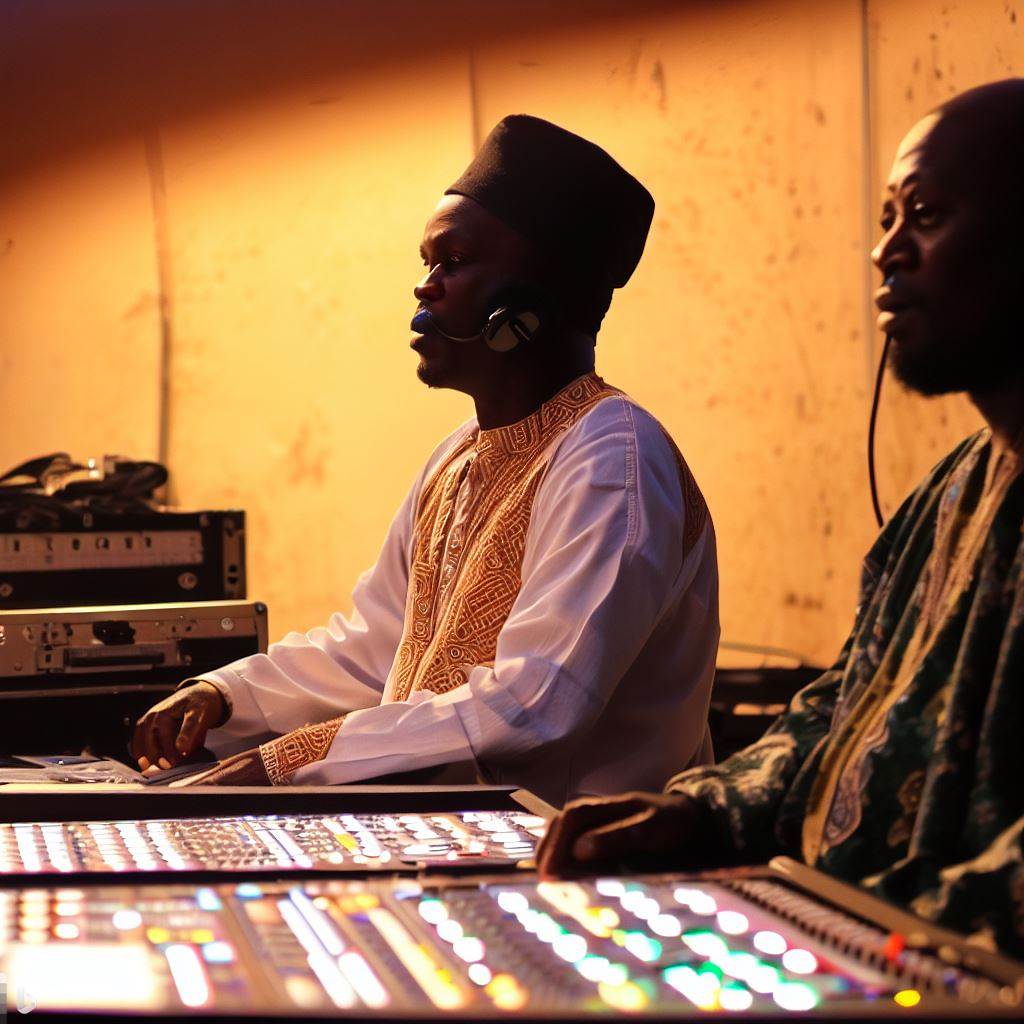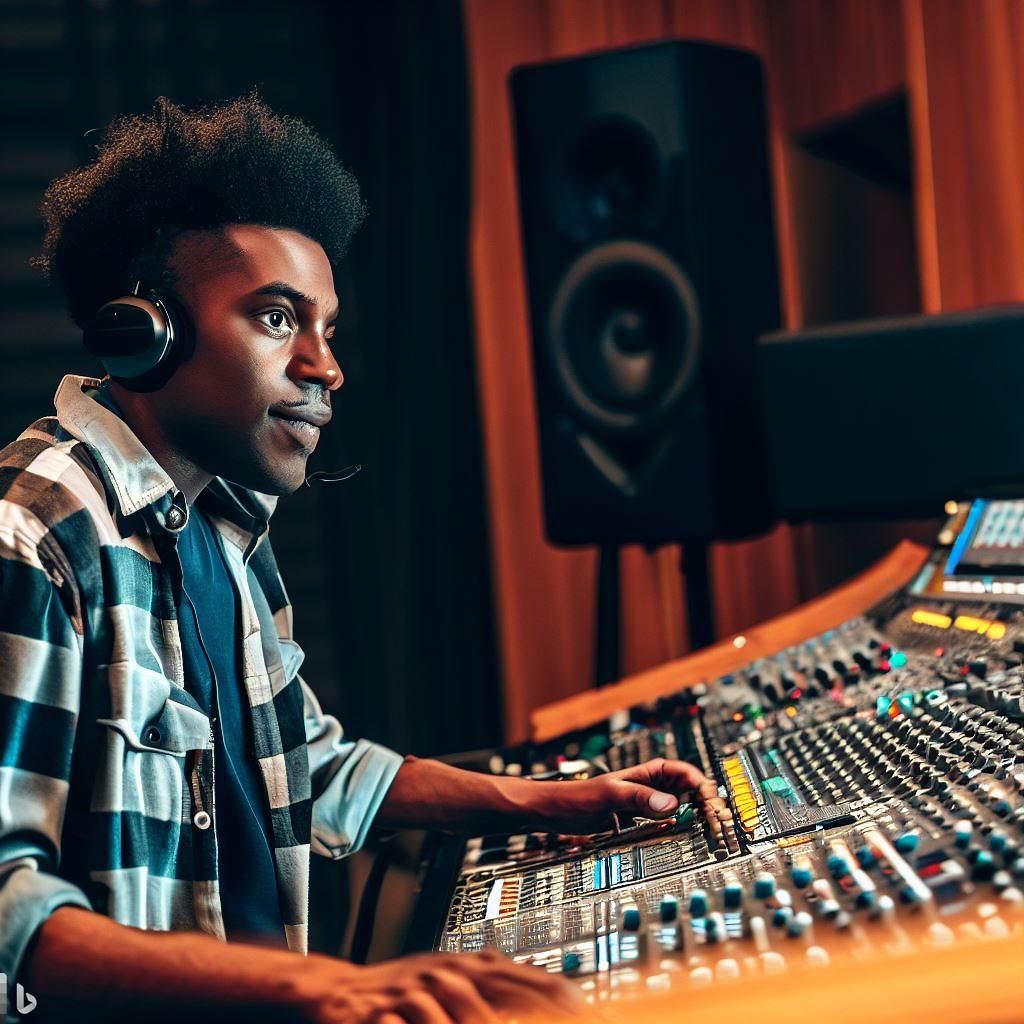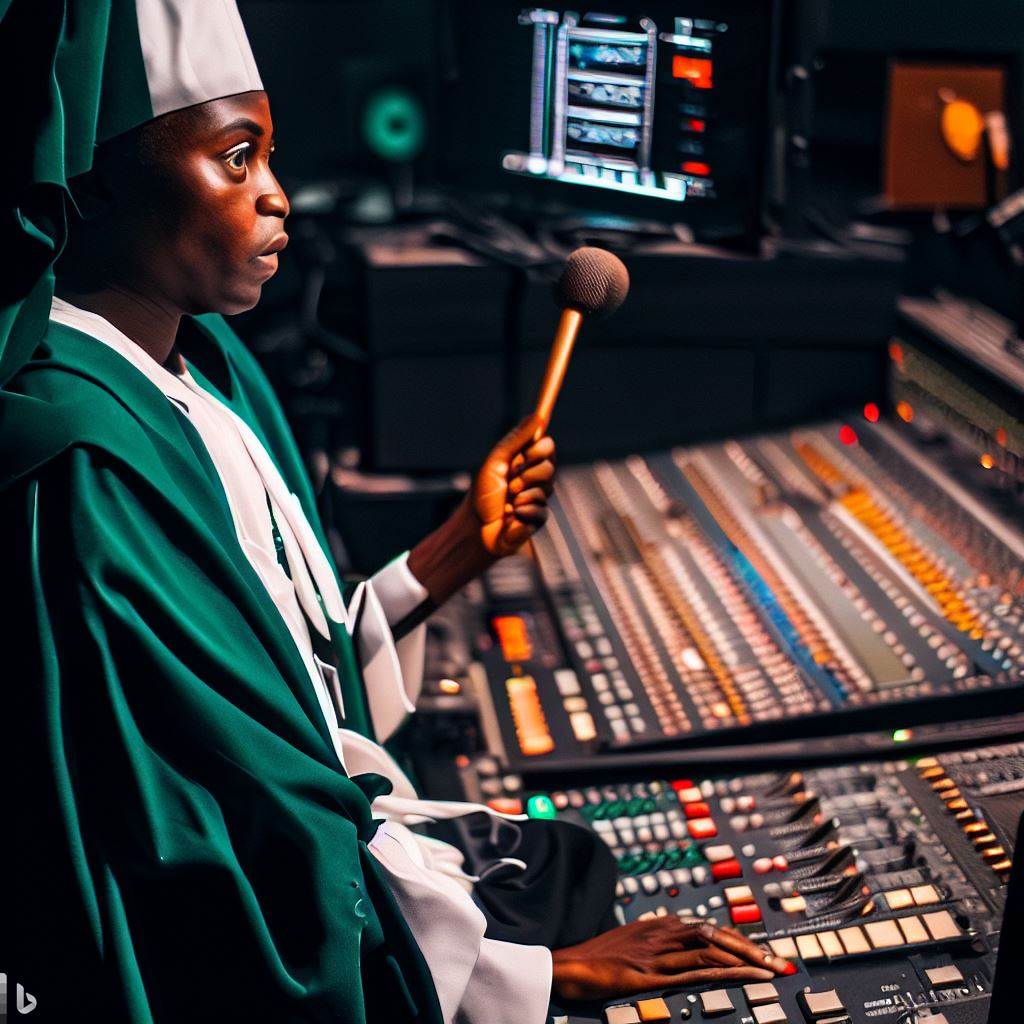Introduction
Sound editing plays a crucial role in various fields, enhancing audio quality and overall experience.
Sound editing is important in fields like film, music production, podcasts, and video games.
Nigeria is experiencing emerging trends in sound editing, with advancements in technology and growing talent.
Emerging trends in sound editing are reshaping Nigeria’s auditory experiences.
Sound editing’s significance spans film, music, gaming, and virtual reality, enhancing immersive storytelling.
Overview of the Emerging Trends in Sound Editing in Nigeria
- Immersive Audio: Sound editing advances spatial audio, enveloping listeners in realistic and multidimensional sonic environments.
- Virtual Reality (VR) and Gaming: Sound editors enhance VR and gaming experiences, heightening immersion through realistic auditory cues.
- Cultural Fusion: Sound editors integrate traditional Nigerian sounds into contemporary genres, infusing authenticity into music.
- Foley Innovation: Creative sound design augments realism, bringing life to visuals and enriching storytelling in film.
- Collaborative Synergy: Sound editors collaborate across disciplines, synergizing their expertise to elevate creative projects.
These emerging trends signify an exciting phase in Nigeria’s sound editing landscape, aligning it with global innovations.
The Evolution of Sound Editing in Nigeria
Early days of sound editing in Nigeria
Sound editing in Nigeria initially relied on basic manual techniques and limited equipment. Editors had to physically splice tape, manually synchronize dialogues, and add sound effects.
Due to the lack of advanced tools, the process was time-consuming and required great attention to detail.
Despite the challenges, early Nigerian sound editors played a crucial role in the budding film industry. They had to rely on their creativity and skills to ensure quality audio in movies.
Advancements in technology that influenced sound editing
Technological advancements in the past decades have greatly influenced sound editing in Nigeria.
- The introduction of digital audio workstations (DAWs) revolutionized the editing process.
- DAWs allowed for easier manipulation, synchronization, and integration of audio elements.
- Sound editors now have access to a wide range of professional-grade tools and software.
- The advancements in technology have significantly improved the efficiency, precision, and overall quality of sound editing.
Impact of globalization on the Nigerian sound editing industry
Globalization has had a profound impact on the Nigerian sound editing industry.
- Access to international markets has increased demand for high-quality sound editing.
- Nigerian sound editors are now exposed to global trends and techniques.
- Collaboration and exchange of ideas with international professionals have become more prevalent.
- Globalization has also opened opportunities for Nigerian sound editors to work on international projects.
Read: Training Institutes for Sound Editors in Nigeria
Current State of Sound Editing in Nigeria
Established Sound Editing Techniques and Practices
- Use of Foley techniques: Sound editors in Nigeria utilize Foley techniques to create realistic sound effects.
- Dialogue editing: Precise editing of dialogue is crucial to ensure clarity and synchronization in films.
- Music editing: Sound editors skillfully integrate and edit music tracks to enhance storytelling and emotional impact.
- Sound effects creation: Creative sound designers create unique sound effects to complement the visuals.
- Mixing and mastering: Sound editors combine and balance different audio elements to achieve a cohesive final mix.
Challenges Faced by Sound Editors in Nigeria
- Limited funding: Sound editing projects often face financial constraints, affecting access to necessary equipment and tools.
- Inadequate training and education: The lack of sound editing programs or institutions makes it challenging to develop skilled professionals.
- Limited recognition and support: Sound editing as a profession in Nigeria is often underappreciated and undervalued.
- Lack of industry standards: The absence of standardized practices and guidelines hinders the growth of sound editing.
- Technical limitations: Outdated equipment and software pose obstacles to achieving high-quality sound editing.
Existing Talent Pool and Resources for Sound Editing in Nigeria
- Skilled sound editors: Nigeria boasts a pool of talented sound editors who have acquired expertise through hands-on experience.
- Creative sound designers: There is a growing community of sound designers in Nigeria who contribute to innovative soundscapes.
- Music producers: Collaborations with music producers add depth and richness to the sound editing process.
- Independent studios: Several independent studios offer facilities and equipment for sound editing projects.
- Online resources: Sound editors in Nigeria have access to online tutorials, forums, and resources to enhance their skills.
In fact, the current state of sound editing in Nigeria presents both opportunities and challenges.
Despite financial constraints and a lack of recognition, sound editors in Nigeria continue to showcase their talent and creativity.
The use of established techniques such as Foley, dialogue editing, and music editing uplift the quality of sound in Nigerian films
However, there is a need for more support, standardized practices, and improved access to training and resources to further develop the field of sound editing in Nigeria.
With the existing talent pool and available resources, there is immense potential for growth and innovation in the Nigerian sound editing industry.
Read: Challenges Faced by Sound Effects Editors in Nigeria
Emerging Trends in Sound Editing in Nigeria
Increasing demand for high-quality sound editing in Nollywood
Sound editing is becoming increasingly vital in Nollywood as filmmakers recognize its impact on storytelling.
The Nigerian film industry has experienced tremendous growth in recent years, and with that growth comes higher expectations.
Audiences now demand movies with high-quality production values, including crisp and immersive sound.
This demand has led to a greater emphasis on sound editing, as it plays a crucial role in creating a captivating cinematic experience.
Sound editing enhances the mood, adds depth to the scenes, and creates emotional resonance with the audience.
As Nollywood continues to expand globally, the need for impressive sound editing becomes even more critical.
Use of advanced software and tools in sound editing
Advanced software and tools have revolutionized the sound editing process in Nigeria.
Gone are the days when sound editing involved purely manual work; now, sophisticated software and tools are prevalent.
These tools help sound editors manipulate and enhance audio tracks, ensuring they sync perfectly with the visuals.
Popular software like Pro Tools, Adobe Audition, and Nuendo offer a range of features tailored to sound editing needs.
These advanced tools allow for precise control over sound effects, dialogue, music, and overall audio balance.
They also enable seamless integration with other post-production processes, such as sound mixing and mastering.
Thanks to these advancements, sound editors in Nigeria can deliver professional-grade sound quality that meets international standards.
Growing inclination towards immersive sound experiences
Immersive sound experiences have gained immense popularity in Nigeria, transforming the way films sound.
Audiences crave a more immersive and realistic cinematic experience, and sound plays a crucial role in achieving this.
Sound editors now employ techniques like spatial audio and surround sound to create a 360-degree auditory experience.
These techniques allow sound to move dynamically, enveloping the viewers and enhancing their emotional engagement.
Immersive sound experiences have the power to transport viewers into the world of the film and enhance their emotional connection.
This trend towards immersive sound has also opened up new avenues for collaboration between sound editors and composers.
Working together, they can craft a complete audio landscape that elevates the overall film experience.
As audiences continue to seek more immersive experiences, it is expected that the demand for innovative sound editing will only grow.
In short, the Nigerian film industry is witnessing a surge in the demand for high-quality sound editing.
This increasing demand has led to the adoption of advanced software and tools, which have transformed the sound editing process.
Additionally, there is a noticeable shift towards creating immersive sound experiences that enhance the cinematic experience for audiences.
With these emerging trends, sound editing in Nigeria is poised to reach new heights and contribute significantly to the success of Nollywood films.
Read: Nigeria’s Entertainment Industry: A Goldmine for Creative Professionals

Case Studies of Successful Nigerian Sound Editors
Work and achievements of prominent sound editors in Nigeria
In Nigeria, there are several talented and successful sound editors who have made significant contributions to the industry.
These individuals have not only elevated the quality of sound in Nigerian films but have also garnered recognition both locally and internationally.
One prominent sound editor is Tunde Adegbola, who has worked on numerous successful Nigerian films.
With his exceptional skills and attention to detail, Adegbola has been able to create immersive soundscapes that enhance the storytelling experience in films.
His ability to capture the essence of a scene through sound has made him a sought-after professional in the industry.
Another notable sound editor is Funke Olowe, renowned for her innovative approaches to sound editing.
Olowe has constantly pushed the boundaries of traditional sound editing techniques by incorporating unique and experimental sounds into the films she works on.
Her unconventional methods have resulted in captivating sound designs that have captivated audiences across Nigeria.
Their contributions to the industry and their innovative approaches
Both Adegbola and Olowe have significantly contributed to the growth and development of sound editing in Nigeria.
Through their work, they have shown that sound editing is not just a technical aspect of filmmaking but an art that can greatly impact the audience’s emotional connection to a film.
Adegbola’s meticulous attention to detail has raised the bar for sound editing in Nigerian films.
His ability to capture the essence of a scene through sound has not only enriched the storytelling process but has also elevated the overall cinematic experience for audiences.
Adegbola’s work has set a standard for sound editing in Nigeria and has inspired upcoming sound editors to strive for excellence.
Olowe’s innovative approaches to sound editing have challenged the traditional norms of the industry.
By incorporating unconventional sounds and experimenting with different techniques, she has been able to create unique and memorable auditory experiences for viewers.
Olowe’s work has proven that sound editing is not limited to replicating reality but can also be used as a creative tool for artistic expression.
Awards or recognitions they have received
Both Tunde Adegbola and Funke Olowe have received recognition for their outstanding contributions to sound editing in Nigeria.
Adegbola has been awarded the Best Sound Editor at the Nigerian Entertainment Awards for three consecutive years, solidifying his position as a leading figure in the industry.
Olowe has also garnered acclaim for her innovative approaches to sound editing.
She received the Excellence in Sound Editing Award at the African Movie Academy Awards for her exceptional work on a critically acclaimed Nigerian film.
Olowe’s recognition at both local and international platforms further highlights her impact on the industry.
In essence, the significant contributions and accomplishments of notable sound editors in Nigeria have been instrumental in molding the industry and elevating it to unprecedented levels.
Personalities such as Tunde Adegbola and Funke Olowe have not solely advanced sound editing excellence but have also fostered a climate of creativity and ingenuity.
Their contributions have elevated the overall quality of Nigerian films and have earned them well-deserved accolades and recognition.
Read: Market Demand for Sound Effects Editors in Nigeria
Opportunities and Challenges in the Future of Sound Editing in Nigeria
Potential for growth and opportunities in the industry
Nigeria’s booming entertainment industry presents immense potential for growth in sound editing.
- With the popularity of Nollywood films and music, the demand for high-quality sound editing is increasing.
- Sound editors have the opportunity to collaborate with talented filmmakers and musicians, contributing to their success.
- The rise of streaming platforms like Netflix and Amazon Prime offers a broader audience for Nigerian content.
- Sound editors can explore international collaborations, providing exposure and opportunities for growth.
- The abundance of local talent and diverse soundscapes in Nigeria adds richness to sound editing projects.
Need for sound editing training and education in Nigeria
Despite the growing opportunities, the sound editing industry in Nigeria lacks a robust training ecosystem.
- There is a need for specialized sound editing courses and workshops to develop skilled professionals.
- Training programs should cover technical aspects, artistic techniques, and the importance of sound design in storytelling.
- Acquiring knowledge in sound editing software and equipment will enhance the capabilities of aspiring editors.
- Collaboration with international experts can provide exposure to best practices in sound editing.
- Educational institutions should offer courses that cater specifically to the needs of sound editing professionals.
Challenges that may arise due to budget constraints and limited resources
- Limited budgets pose a significant challenge for sound editors in Nigeria, affecting the quality of the final product.
- Investing in high-quality equipment and software may be difficult due to financial constraints.
- Lack of access to sound libraries and advanced sound editing tools limits creativity and hinders professional growth.
- Adequate funding for sound editing projects is essential to ensure the delivery of exceptional work.
- Collaboration with producers and directors to prioritize sound editing in project budgets can mitigate these challenges.
- Government support and incentives can be instrumental in overcoming resource limitations for sound editors in Nigeria.
Generally, the future of sound editing in Nigeria holds immense opportunities for growth in the entertainment industry.
With the rising demand for high-quality content, sound editors have the chance to contribute to the success of Nollywood films and music.
However, to fully harness this potential, there is a need for sound editing training and education programs.
Budget constraints and limited resources present challenges that can be addressed through proper funding and governmental support.
By overcoming these challenges and tapping into the available opportunities, sound editing in Nigeria can reach new heights and make a significant impact on the global entertainment industry.
Read: Success Stories: Top Nigerian Sound Effects Editors
Conclusion
In this blog post, we have explored the emerging trends in sound editing in Nigeria.
We discussed the rise of digital technology in sound editing, the importance of incorporating local sounds and music, and the advancements in software and equipment.
These trends have led to the growth of the Nigerian sound editing industry and have opened up new opportunities for aspiring sound editors.
Staying updated with emerging trends in sound editing is crucial for sound editors in Nigeria.
It allows them to remain competitive in the industry and keep up with the demands of clients and audiences.
Embracing tech enhances sound editors’ role, elevating audio quality in films, TV, and music.
To all aspiring sound editors in Nigeria, we encourage you to pursue your passion and explore the exciting world of sound editing.
The industry is constantly evolving, and there is a demand for talented sound editors who can push boundaries and bring fresh perspectives to projects.
By honing your skills, staying updated with emerging trends, and contributing your unique voice, you can play a crucial role in the growth and development of the sound editing industry in Nigeria.
Remember, your passion for sound and your dedication to your craft can make a significant impact and help shape the future of sound editing in Nigeria.
Publish Your Professional Profile, Business or Brand
Showcase your expertise, gain trust, and boost visibility instantly on Professions.ng.
Publish Now



